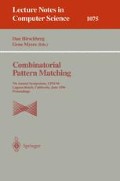Abstract
We introduce a methodology for knowledge acquisition and concept learning from texts that relies upon a quality-based model of terminological reasoning. Concept hypotheses which have been derived in the course of the text understanding process are assigned specific “quality labels” (indicating their significance, reliability, strength). Quality assessment of these hypotheses accounts for conceptual criteria referring to their given knowledge base context as well as linguistic indicators (grammatical constructions, discourse patterns), which led to their generation. We advocate a metareasoning approach which allows for the quality-based evaluation and a bootstrapping-style selection of alternative concept hypotheses as text understanding incrementally proceeds.
Preview
Unable to display preview. Download preview PDF.
References
Agarwal, R. & M. Tanniru (1991). Knowledge extraction using content analysis. Knowledge Acquisition, 3(4):421–441.
Friedman, D. & M. Wand (1984). Reification: reflection without metaphysics. In Proc. of the 1984 ACM Symposium on Lisp and Functional Programming, pp. 348–355. Austin, Texas, August 1984.
Gao, Y. & S. Salveter (1991). The Automated Knowledge Engineer: natural language knowledge acquisition for expert systems. In Proc. 6th Knowledge Acquisition for Knowledge-Based Systems Workshop, pp. 8.1–8.16. Banff, Canada.
Gomez, F. & C. Segami (1990). Knowledge acquisition from natural language for expert systems based on classification problem-solving methods. Knowledge Acquisition, 2(2):107–128.
Hahn, U., M. Klenner & K. Schnattinger (1996a). Automatic concept acquisition from real-world texts. In Proc. of the AAAI Spring Symposium on ‘Machine Learning in Information Access'. Stanford, Cal., March 1996. San Mateo, CA: AAAI Press.
Hahn, U., M. Klenner & K. Schnattinger (1996b). Learning from texts: a terminological metareasoning perspective. In S. Wermter, E. Riloff & G. Scheler (Eds.), Connectionist, Statistical and Symbolic Approaches to Learning in Natural Language Processing, pp. 453–468. Berlin: Springer.
Hahn, U., S. Schacht & N. Bröker (1994). Concurrent, object-oriented dependency parsing: the ParseTalk model. International Journal of Human-Computer Studies, 41(1–2):179–222.
Handa, K. & S. Ishizaki (1989). Acquiring knowledge about a relation between concepts. In EKAW'89 — Proc. Europ. Knowledge Acquisition Workshop, pp. 380–390.
Hastings, P. (1996). Implications of an automatic lexical acquisition system. In S. Wermter, E. Riloff & G. Scheler (Eds.), Connectionist, Statistical and Symbolic Approaches to Learning in Natural Language Processing, pp. 261–274. Springer.
Hastings, P. & S. Lytinen (1994). The ups and downs of lexical acquisition. In AAAI'94 — Proc. of the 12th National Conf. on Artificial Intelligence. Vol. 2, pp. 754–759. Seattle, Wash., July/August 1994. Menlo Park: AAAI Press/MIT Press.
Lewis, D. (1991). Learning in intelligent information retrieval. In L. Birnbaum & G. Collins (Eds.), Machine Learning: Proc. of the 8th Intl. Workshop, pp. 235–239. Chicago, Ill., June 1991. San Mateo, CA: Morgan Kaufmann.
MacGregor, R. (1994). A description classifier for the predicate calculus. In AAAI'94 — Proc. of the 12th National Conf. on Artificial Intelligence. Vol. 1, pp. 213–220. Seattle, Wash., July/August 1994. Menlo Park: AAAI Press/MIT Press.
Martin, W. (1992). Concept-oriented parsing of definitions. In COLING'92 — Proc. 15th Intl. Conf. on Computational Linguistics, pp. 988–992. Nantes, France.
McCarthy, J. (1993). Notes on formalizing context. In IJCAI'93 — Proc. of the 13th Intl. Joint Conf. on Artificial Intelligence. Vol. 1, pp. 555–560. Chambery, France, August/September 1993. San Mateo, CA: Morgan Kaufmann.
Mooney, R. (1987). Integrated learning of words and their underlying concepts. In Proc. of the 9th Annual Conf. of the Cognitive Science Society, pp. 974–978. Seattle, Wash., July 1987. Hillsdale, NJ: L. Erlbaum.
Reimer, U. (1990). Automatic knowledge aquisition from texts: learning terminological knowledge via text understanding and inductive generalization. In Proc. 5th Knowledge Acquisition for Knowledge-Based Systems Workshop, pp. 27.1–27.16. Banff, Canada.
Resnik, P. (1992). A class-based approach to lexical discovery. In Proc. of the 30th Annual Meeting of the Association for Computational Linguistics, pp. 327–329. Newark, Delaware, USA, June/July 1992.
Schmidt, G. & T. Wetter (1989). Towards knowledge acquisition in natural language dialogue. In EKAW'89 — Proc. Europ. Knowl. Acquisition Workshop, pp. 239–252.
Schnattinger, K. & U. Hahn (1996). A sketch of a qualification calculus. In FLAIRS'96 — Proc. of the 9th Florida AI Research Symposium. Key West, Florida, May 1996.
Schnattinger, K., U. Hahn & M. Klenner (1995). Terminological meta-reasoning by reification and multiple contexts. In Progress in Artificial Intelligence. EPIA'95 — Proc. of the 7th Portuguese Conf. on Artificial Intelligence, pp. 1–16. Funchal., Madeira Island, Portugal., October 1995. Berlin: Springer.
Sekine, S., J. Carroll, S. Ananiadou & J. Tsujii (1992). Automatic learning for semantic collocation. In Proc. of the 3rd Conf. on Applied Natural Language Processing, pp. 104–110. Trento, Italy, March/April 1992.
Skuce, D., S. Matwin, B. Tauzovich, F. Oppacher & S. Szpakowicz (1985). A logic-based knowledge source system for natural language documents. Data & Knowledge Engineering, 1(3):201–231.
Strube, M. & U. Hahn (1995). ParseTalk about sentence-and text-level anaphora. In EACL'95 — Proc. of the 7th Conf. of the European Chapter of the Association for Computational Linguistics, pp. 237–244. Dublin, Ireland, March 1995.
Virkar, R. & J. Roach (1989). Direct assimilation of expert-level knowledge by automatically parsing research paper abstracts. International Journal of Expert Systems 1, 1(4):281–305.
Woods, W. & J. Schmolze (1992). The KL-ONE family. Computers & Mathematics with Applications, 23(2–5):133–177.
Author information
Authors and Affiliations
Editor information
Rights and permissions
Copyright information
© 1996 Springer-Verlag Berlin Heidelberg
About this paper
Cite this paper
Hahn, U., Klenner, M., Schnattinger, K. (1996). A quality-based terminological reasoning model for text knowledge acquisition. In: Shadbolt, N., O'Hara, K., Schreiber, G. (eds) Advances in Knowledge Acquisition. EKAW 1996. Lecture Notes in Computer Science, vol 1076. Springer, Berlin, Heidelberg. https://doi.org/10.1007/3-540-61273-4_9
Download citation
DOI: https://doi.org/10.1007/3-540-61273-4_9
Published:
Publisher Name: Springer, Berlin, Heidelberg
Print ISBN: 978-3-540-61273-5
Online ISBN: 978-3-540-68391-9
eBook Packages: Springer Book Archive

